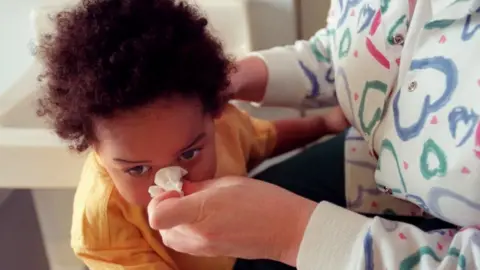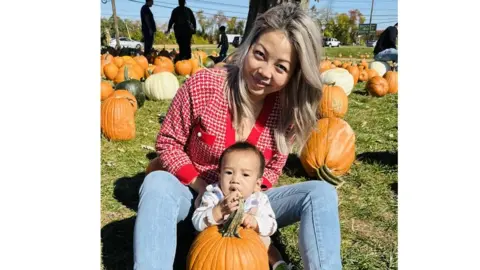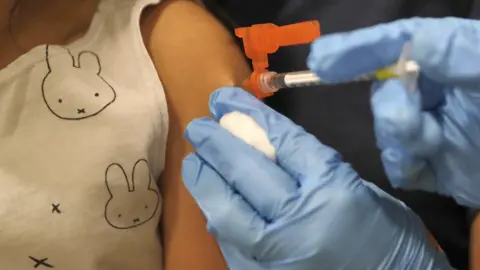RSV and flu surge in US ahead of holidays – what to know
 Getty Images
Getty ImagesWith the holiday season approaching in the US, doctors are urging people to exercise caution to avoid a surge in common and potentially dangerous winter viruses.
The US is facing a rise in cases of respiratory syncytial virus (RSV), with some hospitals opening extra beds to treat patients, while there are concerns about other illnesses such as flu.
Winnie Chow, a parent to 10-month-old Cooper, took her son to hospital earlier this month after he had been vomiting and coughing for several days. He spent four days there recovering from RSV.
"I was in tears," said Ms Chow, who lives in Hackensack, New Jersey. "For him to be there for more than a day was very scary."
Ms Chow is one of many parents who have had to seek care for an unwell child as winter viruses arrive earlier and with more severity than in recent years - a trend experts say could persist as people gather indoors for the winter holidays.
 Winnie Chow
Winnie Chow"We do worry when people start gathering," said Richard Malley, a senior physician with the Division of Infectious Disease at Boston Children's Hospital in Massachusetts.
"When you have multiple generations mingling together, you have an increased risk of transmission from someone who is handling the virus pretty well to someone who may not handle it well at all."
What is RSV and what are the symptoms?
RSV can manifest like a common cold in adults, but can prove dangerous for some young children.
Symptoms include a cough, congestion, runny nose and fever as well as wheezing in young infants, according to Rachel Orscheln, the director of ambulatory paediatric infectious diseases at St Louis Children's Hospital.
For the most vulnerable, RSV can lead to bronchiolitis, a condition that includes a build-up of inflammation in the lungs and difficulty breathing. There is no vaccine for RSV but scientists are working on developing one.
It can be difficult to distinguish between RSV, coronavirus and the flu because the respiratory viruses include many of the same symptoms and usually peak in winter.
But physicians can use tests to diagnose patients to determine the best course of treatment.
Parents should reach out to their child's healthcare provider if they begin to have concerns, especially if they are experiencing worsening symptoms, difficulty breathing or are struggling to drink fluids, said Sonali Advani, an assistant professor of medicine at Duke University's Division of Infectious Diseases.
Why are RSV and flu cases rising?
Experts say protective measures like social distancing, mask wearing and other hygiene practices from the coronavirus pandemic likely shielded some children from exposure to the flu and their first RSV infection, which most children normally experience by age two.
This means they may now be more vulnerable to infection.
An earlier RSV season followed by more severe flu infections has created a "perfect storm" that is "flooding our paediatric capacity", said Daniel Rauch, the chief of Paediatric Hospital Medicine at Tufts Medicine in Massachusetts.
He told the BBC a reduction in hospital beds for children during the coronavirus pandemic, which was intended to make space for adults who are more vulnerable to severe illness from Covid, had worsened the current problem.
Some experts said they were not optimistic the issues would resolve soon, as close contact during the the winter holiday season could offer more opportunities for viral transmission.
How to stay safe
Getting vaccinated against Covid and the flu offers one of the best forms of protection against some of the respiratory illnesses that are circulating, experts told the BBC.
US infectious disease chief Dr Anthony Fauci said the flu jab was "well matched" to the circulating strain, while White House Covid co-ordinator Dr Ashish Jha urged Americans to "make protecting our loved ones an important part of the conversation we have around the Thanksgiving table".
 Getty Images
Getty ImagesTaking a rapid test for Covid on the morning of winter holiday celebrations adds another potential layer of protection, Dr Malley said.
He added that parents could also make sure any person serving food during large family gatherings is symptom-free and handling the food in a hygienic manner.
Handwashing and avoiding touching your face and mouth are also advised.
"If you're sick, maybe skip the family gathering this year," Dr Rauch said. "Don't bring it to everybody else."
Parents and children should also wear masks during travel on planes, trains and other public transportation and could do so during gatherings where they are unsure others are vaccinated, Dr Rauch said.
In the meantime, Amy Knight, the president of the Children's Hospital Association which represents more than 220 hospitals across the US, said paediatric hospitals were "getting creative" and finding extra space for patients while working to keep conditions as normal as possible.
"No one likes to have a sick child," she said.
"It's an incredibly stressful time, but many have also been understanding in recognising that the hospital has a big challenge and a big job, and they're grateful to be there and grateful to have the care."
Additional reporting by Gareth Evans
